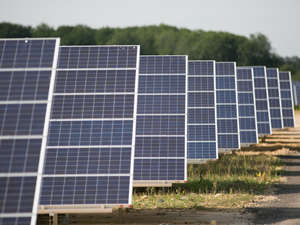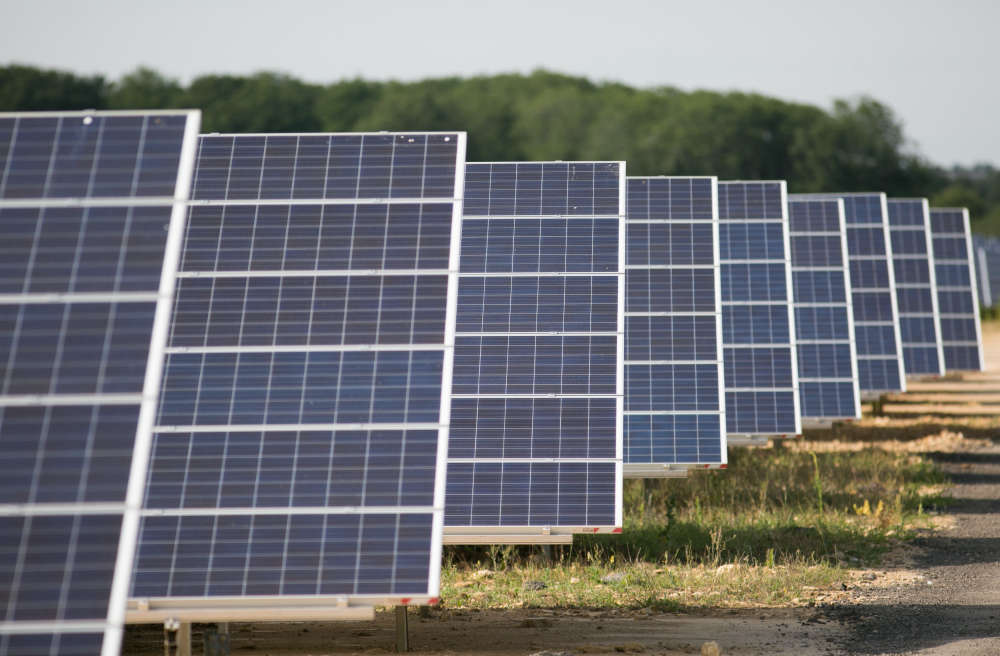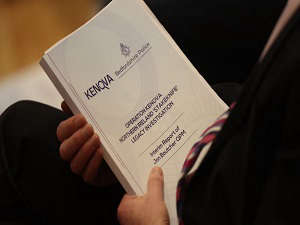
Q Radio News/PA
A Stormont report has questioned whether a £5 billion renewable energy subsidy scheme delivered value for money.
The Public Accounts Committee also expressed concern that the Northern Ireland Renewables Obligation (NIRO) scheme resulted in negative unintended planning and environmental issues.
The PAC acknowledged that the NIRO, which used subsidies to incentivise the use of renewable energy sources, met and exceeded its main objective of increasing eco-friendly electricity generation.
More than 45% of electricity consumed in Northern Ireland now comes from renewable sources, according to the Department for the Economy.
The NIRO subsidies were paid for by UK electricity suppliers through additions to consumer bills across the UK.
Under the complex structure of the scheme, owners of single generation units, such as standalone turbines and anaerobic digester plants, received proportionately higher payments than owners of larger wind farms.
Small-scale wind turbines only generate about 13% of all renewable electricity consumed in Northern Ireland, yet they received about 40% of the total financial support available under the scheme.
The committee’s investigation followed on from a critical NI Audit Office report that found that the small scale generators had received “excessive” payouts.
Renewables industry representatives had however challenged the figures contained in the Audit Office report, claiming its estimates of individual rates of return were too high.
The scheme, which was introduced in 2005, was set up by the Department of Enterprise, Trade and Investment and then became the responsibility of its successor the Department for the Economy.
In the absence of official data on the likely costs of the scheme over its lifetime, the Audit Office estimated that the sum could be about £5 billion.
The scheme is closed to new applicants but payouts to accredited participants will continue until 2038.

Solar panels, a source of renewable energy. A Stormont report has questioned whether a £5 billion renewable energy subsidy scheme delivered value for money
In its report, the PAC said the scheme did not have cost controls that were included in similar initiatives in Great Britain.
Members expressed concern that it was a design fault that led to overgenerous financial support to small-scale renewable electricity generators.
The report questioned why Stormont had been unable to monitor rates of return by those applicants accredited under the scheme.
The committee also identified a lack of joined-up thinking and formal engagement between Stormont officials and other key public bodies before introducing the scheme.
The result of this, the committee concluded, meant a number of planning and environmental risks were not identified until long after the scheme was up and running, making them more difficult to manage.
It expressed concern that the scheme was unable to withhold subsidies for applicants who did not comply with planning or environmental regulations.
Chairman of the PAC, DUP MLA William Humphrey said: “Supported by important government initiatives, the renewables industry has created many local jobs, reduced reliance on imported fossil fuels and helped control electricity prices as a whole.
“However, we were surprised to find there was no certainty that the scheme, estimated at a cost of £5 billion to UK electricity consumers, was delivered at the lowest cost to UK electricity consumers.
“Unfortunately we are unable to ascertain this as both DETI and DfE were not provided with key cost data from those generating energy for the power grid.
“We believe that any future scheme must include a requirement to provide such cost detail as a condition of funding.”
He added: “While we do not ignore the benefits that this scheme has brought Northern Ireland, we are concerned that there were a number of areas which must be improved, if schemes like this are to provide value for money.
“We noted that the inability of the department to ascertain and monitor actual rates of return, particularly for small-scale generating stations, meant there was no opportunity to reduce the level of financial support to ensure that the scheme did not become unnecessarily costly for consumers.”
The committee made a total of eight recommendations to inform the design and provision of similar initiatives in the future.

Chair of the Public Accounts Committee, DUP MLA William Humphrey
Responding to the PAC report, a DfE spokesman said: “Electricity produced from renewable sources has been the major success story in Northern Ireland in our efforts to address climate change.
“Since 2005 the NI Renewables Obligation (NIRO) scheme has been the main support mechanism behind this achievement.
“The department welcomes the fact that the committee recognised the scheme has met and exceeded its primary objectives of incentivising renewables development and increasing the consumption of electricity generated from renewable energy sources – at the end of June 2021, 45.4% of all electricity consumed in Northern Ireland came from renewable energy sources.
“Furthermore, the committee has accepted that the renewables industry, supported by government initiatives, has created many local jobs, reduced reliance on imported fossil fuels and helped control electricity prices as a whole.
“The department welcomes the publication of the report and will consider the committee’s recommendations fully.”


 Bikers to descend on Westminster for veterans protest against Legacy Act repeal
Bikers to descend on Westminster for veterans protest against Legacy Act repeal
 Guidance sought over future of colourful parakeets in Belfast park
Guidance sought over future of colourful parakeets in Belfast park
 Woman released after questioning over pipe bombs in Co Down
Woman released after questioning over pipe bombs in Co Down
 Suspended chief constable will not be prosecuted over alleged sexual offences
Suspended chief constable will not be prosecuted over alleged sexual offences
 MI5 files not deliberately withheld from Stakeknife probe, review concludes
MI5 files not deliberately withheld from Stakeknife probe, review concludes